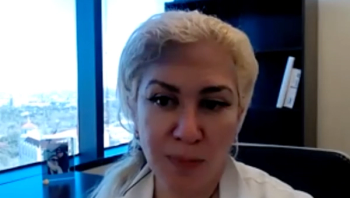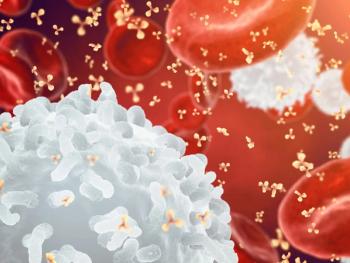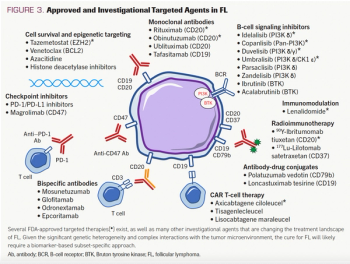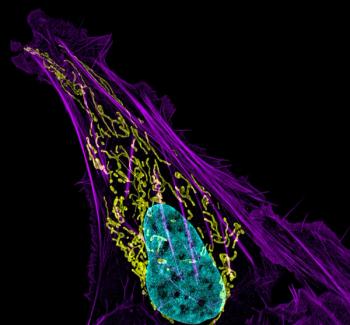
Patients with previously treated metastatic urothelial carcinoma or renal cell carcinoma experienced promising benefit from treatment with niraparib and cabozantinib.

Your AI-Trained Oncology Knowledge Connection!


Patients with previously treated metastatic urothelial carcinoma or renal cell carcinoma experienced promising benefit from treatment with niraparib and cabozantinib.

At 2022 ASCO GU, early trial results show promise for fluorodeoxyglucose and sodium fluoride PET/CT prognostic ability to predict survival in patients with metastatic genitourinary malignancies treated with cabozantinib plus PD-1/CTLA-3 inhibition.
![A statistically significant benefit in terms of radiographic progression-free survival (rPFS) was noted with the use of olaparib (Lynparza) vs placebo in combination with abiraterone acetate (Zytiga) for patients with frontline metastatic castration-resistant prostate cancer (mCRPC), according to results of the phase 3 PROpel trial (NCT03732820) that were presented at the 2022 Genitourinary Cancers Symposium.1 The median investigator-assessed rPFS was 24.8 months with olaparib/abiraterone vs 16.6 months with placebo/abiraterone (HR, 0.66; 95% CI, 0.54-0.81; P <.0001), which translated to a 34% reduction in the risk of radiographic disease progression or death. The 1- and 2-year rPFS rates were 71.8% and 51.4% in the olaparib/abiraterone arm, respectively; these rates were 63.4% and 33.6% with placebo/abiraterone, respectively. When evaluated by blinded independent central review, the median rPFS with olaparib/abiraterone was 27.6 months vs 16.4 months with placebo/abiraterone, leading to a 39% reduction in the risk of radiographic disease progression or death (HR, 0.61; 95% CI, 0.49-0.74; P <.0001). The 1- and 2-year rPFS rates with olaparib plus abiraterone were 73.8% and 53.7%, respectively. In the placebo/abiraterone arm, these rates were 60.6% and 34.1%, respectively. Lead study author Fred Saad, MD, FRCS, said that PROpel is the first combination approach to deliver consistent clinical benefits for patients in the first-line mCRPC setting, irrespective of homologous recombination repair (HRR) mutation status. “This benefit led to what I think is the longest rPFS we have seen to date in metastatic CRPC beyond 2 years,” Saad, who is professor and chairman of urology and director of Genitourinary Oncology at the University of Montreal Hospital Center, as well as the Raymond Garneau Chair in Prostate Cancer Research and director of Clinical Research and the Molecular Oncology Research Laboratory in Prostate Cancer, said in a presentation during the meeting. Patients with mCRPC who are treated in the frontline setting have a median survival of approximately 3 years in clinical trial settings, Saad noted, adding that about half of patients in real-world practice only receive 1 line of active treatment. Here, the median survival is less than 2 years, underscoring an unmet need to improve outcomes in the up-front setting. Previously, data with olaparib in mCRPC have shown encouraging results. The phase 3 PROfound trial (NCT02987543) demonstrated significantly prolonged rPFS and overall survival (OS) in patients with mCRPC following a next-generation hormonal agent (NHA) with HRR gene alterations.2 Additionally, a phase 2 trial (NCT01972217) of olaparib and abiraterone showed prolonged investigator-assessed rPFS vs placebo/abiraterone in patients with mCRPC following treatment with docetaxel, regardless of HRR status (HR, 0.65; 95% CI, 0.44-0.97; P = .034).3 In the international, double-blind, phase 3 PROpel trial, investigators randomized patients with mCRPC in the first-line setting 1:1 to receive olaparib at 300 mg twice daily plus abiraterone at 1000 mg daily (n = 399) or placebo and abiraterone at 1000 mg daily (n = 397). Patients could have received docetaxel in the metastatic hormone-sensitive prostate cancer (mHSPC) setting, but no prior abiraterone was allowed. Other NHAs were permitted if they were stopped at least 12 months prior to study enrollment. Patients also had ongoing androgen deprivation therapy and an ECOG performance status of 0 or 1. Stratification factors included site of distant metastases (bone-only vs visceral vs other) and prior taxane in the mHSPC setting (yes vs no). The primary end point was investigator-assessed rPFS, with OS as a secondary end point. Additional outcome measures included time to first subsequent therapy or death (TFST), time to second progression or death (PFS2), objective response rate (ORR), HRR mutation prevalence (retrospective testing), health-related quality of life, and safety and tolerability. Baseline characteristics were well-balanced between the 2 arms. The median age was 69.5 years (range, 43-91), and most patients had an ECOG performance status of 0 (70.1%). Of note, symptomatic patients (Brief Pain Inventory-Short Form ≥4 and/or opiate use) comprised 25.8% and 20.2% of olaparib- and placebo-treated patients, respectively; 22.5% of patients had received docetaxel at the mHSPC stage. Additionally, patients either had HRR mutations (27.8% with olaparib vs 29.0% with placebo), non-HRR mutations (69.9% vs 68.8%, respectively), or unknown HRR mutation status (2.3% each). The median PSA was 17.90 ug/L (interquartile range [IQR], 6.09-67.00) with olaparib/abiraterone and 16.81 ug/L (IQR, 6.26-53.30) with placebo/abiraterone. Most metastases occurred in the bone at 87.5% and 85.4% of patients, respectively. Additional findings showed that the rPFS benefit was observed across all prespecified subgroups, including age (<65 years, HR, 0.51; 95% CI, 0.35-0.75; ≥65 years, HR, 0.78; 95% CI, 0.62-0.98), site of distant metastases (bone-only, HR, 0.73; 95% CI, 0.54-0.98; visceral, HR, 0.62; 95% CI, 0.39-0.99; other, HR, 0.62; 95% CI, 0.44-0.85) prior docetaxel (yes, HR, 0.61; 95% CI, 0.40-0.92; no, HR, 0.71; 95% CI, 0.56-0.89) and HRR mutation status (HRR mutant, HR, 0.50; 95% CI, 0.34-0.73; non–HRR mutant, HR, 0.76; 95% CI, 0.60-0.97). “We did do a global interaction test, which was not significant,” Saad added. OS data, which were at 28.6% maturity, showed that the median OS was not reached in either arm but trended toward improved survival with olaparib/abiraterone vs placebo/abiraterone (HR, 0.86; 95% CI, 0.66-1.12; prespecified 2-sided alpha P = .29). TFST also was favored with the addition of olaparib. The median TFST was 25.0 months in the olaparib/abiraterone arm compared with 19.9 months with placebo/abiraterone (HR, 0.74; 95% CI, 0.61-0.90; P = .004). Furthermore, the median PFS2 was not reached in either arm, but supported longer-term benefit with olaparib/abiraterone (HR, 0.69; 95% CI, 0.51-0.94; P = .0184). When evaluated for response, the ORR with olaparib plus abiraterone was 58.4% with a 4.3% complete response (CR) rate and a 54.0% partial response (PR) rate. The stable disease (SD) rate was 26.1% and the progressive disease (PD) rate was 13.7%. In the placebo/abiraterone arm, the ORR was 48.1%, which comprised a 6.3% CR rate and a 41.9% PR rate; the SD and PD rates were 28.1% and 19.4%, respectively. The odds ratio in ORR between olaparib/abiraterone and placebo/abiraterone was 1.60 (95% CI, 1.02-2.53; P = .0409). Saad noted that 40.3% of the overall study population had measurable disease via RECIST v1.1 criteria at baseline. Regarding safety, adverse effects (AEs) occurred in 97.2% and 94.9% of olaparib/abiraterone- and placebo/abiraterone-treated patients, respectively; grade 3 or higher AEs occurred in 47.2% and 38.4% of patients, respectively. AE-related deaths occurred in 4.0% (n = 16) of those on the olaparib arm compared with 4.3% (n = 17) of patients on the placebo arm. Dose interruptions and reductions occurred in 44.7% and 20.1% of patients who received the addition of olaparib; these rates were 25.3% and 5.6% for those on the placebo arm. Additionally, more patients discontinued olaparib due to an AE (13.8%) compared with 7.8% of patients receiving placebo. A total of 8.5% and 8.8% of patients in each arm, respectively, discontinued abiraterone due to an AE. There were no cases reported of myelodysplastic syndrome or acute myeloid leukemia, and the incidence of new primary cancers and pneumonitis were balanced between the 2 arms, Saad said. The AE profiles were consistent with the known toxicity profiles of the individual agents. The most common all-grade and grade 3 or higher AE with olaparib was anemia (46.0% and 15.1%, respectively). In the placebo arm, this occurred in 16.4% and 3.3% of patients, respectively. Cardiac failure occurred at similar rates between the 2 arms at 1.5% with olaparib and 1.3% with placebo; arterial thromboembolic events were also similar at 2.0% and 2.5%, respectively. However, numerically higher venous thromboembolic events were reported for olaparib/abiraterone (7.3%) vs placebo/abiraterone (3.3%), with pulmonary embolism being the most reported venous thromboembolic event (6.5% vs 1.8%, respectively). Pulmonary embolism events were mostly incidental findings via CT scans, and Saad added that this did not lead to treatment discontinuation with either olaparib or abiraterone. Quality of life was also found to be comparable between the 2 groups. References Saad F, Armstrong AJ, Thiery-Vuillemin A, et al. PROpel: phase III trial of olaparib (ola) and abiraterone (abi) versus placebo (pbo) and abi as first-line (1L) therapy for patients (pts) with metastatic castration-resistant prostate cancer (mCRPC). J Clin Oncol. 2022;40(suppl 6):11. doi:10.1200/JCO.2022.40.6_suppl.011 Hussain M, Mateo J, Fizazi K, et al. Survival with olaparib in metastatic castration-resistant prostate cancer. N Eng J Med. 2020;383(24):2345-2357. doi:10.1056/NEJMoa2022485 Clarke N, Wiechno P, Alekseev B, et al. Olaparib combined with abiraterone in patients with metastatic castration-resistant prostate cancer: a randomised, double-blind, placebo-controlled, phase 2 trial. Lancet Oncol. 2018;19(7):975-986. doi:10.1016/S1470-2045(18)30365-6](https://cdn.sanity.io/images/0vv8moc6/cancernetwork/d97c82ab46f3114f8f67bcbafa061ef7adad240a-1200x900.jpg?w=350&fit=crop&auto=format)
Results of the phase 3 PROpel trial presented at 2022 ASCO GU indicate a benefit of olaparib-based therapy for patients with metastatic castration-resistant prostate cancer receiving treatment in the frontline setting.

Despite missing the trial primary end point of overall survival improvement at 1 year, data for avelumab in cisplatin-ineligible, PD-L1–positive advanced urothelial cancer demonstrated superior responses and disease control rates.

Frontline avelumab plus best supportive care as maintenance showed an improvement in overall survival vs best supportive care alone in patients with advanced urothelial cancer treated after chemotherapy.

The European Commission has approved tepotinib for use in patients with advanced non–small cell lung cancer with MET exon 14 skipping alterations.

Patients with metastatic castration-resistant prostate cancer were observed to have a tolerable safety profile when treated with darolutamide.

Data reported from the phase 3 SPOTLIGHT trial of the novel theranostic 18F-rhPSMA-7.3 at 2022 ASCO GU show “excellent image quality” for prostate cancer recurrence detection, according to expert.

Results from the TITAN trial that were presented at 2022 ASCO GU showed a link between deep PSA responses with apalutamide and patient-related outcomes.

Data presented at 2022 ASCO GU of niraparib-based therapy for patients with metastatic castration-resistant prostate cancer showed a boost in radiographic progression-free survival vs matched placebo.

Nora Janjan, MD, MPSA, MBA, gives her perspective on oncology drug development through academic promotion, as an accompaniment to the article titled "Association of Financial Conflicts of Interest With Academic Productivity Among Junior Faculty in Hematology and Oncology" published in the journal ONCOLOGY.

Conflicts of interest for junior faculty members were evaluated at top cancer centers by Suneel D. Kamath, MD, et al. to determine how financial conflicts of interest correlated with measures of academic career productivity.

Data from the ARASENS trials that were presented at 2022 ASCO GU show superior survival outcomes with darolutamide vs placebo plus ADT and docetaxel.

The phase 3b PRESIDE trial showed significant progression-free survival improvement when men with chemotherapy-naïve metastatic castration-resistant prostate cancer were treated with a regimen of continuous enzalutamide vs placebo.

Patients with metastatic castration-sensitive prostate cancer experienced an early and robust reduction in prostate-specific antigen of 90% or more following treatment with apalutamide vs enzalutamide.

Data from the ARAMIS trial that were presented at 2022 ASCO GU showed that darolutamide benefit for patients with nonmetastatic castration-resistant prostate cancer was consistent regardless of the number of comorbidities or concomitant medications.

Eleni Efstathiou, MD, PhD, spoke about the treatment combination of niraparib plus abiraterone acetate and prednisone for the treatmeant of men with metastatic castration-resistant prostate cancer in the phase 3 MAGNITUDE trial.

The FoundationOne Tracker ctDNA monitoring assay was given breakthrough device designation by the FDA for use in early-stage cancer after curative therapy.

Datar Cancer Genetics announced that its TriNetra-Prostate blood test, which was developed to detect early-stage prostate cancer, received breakthrough device designation from the FDA.

The CD19-directed CAR T-cell therapy lisocabtagene maraleucel was granted priority review by the FDA following an application for its use in patients with relapsed or refractory large B-cell lymphoma receiving therapy in the second-line setting.

A new drug application for adagrasib was accepted by the FDA for the treatment of patients with KRAS G12C–mutated non–small cell lung cancer.

Jonathan R. Day, MD, PharmD, and Brian K. Link, MD, give their perspective on emerging treatments for follicular lymphoma.

This review article written by Kirk E. Cahill, MD, and Sonali M. Smith, MD, discusses standard and emerging therapies for the treatment of follicular lymphoma.

Patients with prostate cancer commonly have significant depression, highlighting a need for screenings in those with poor social determinants of health, concomitant disability, and advanced disease.

Fast track designation was granted by the FDA for pidnarulex in patients with BRCA1/2 or PALB2 mutations with ovarian or breast cancer.

Patients with stage II/III HER2-negative breast cancer who were treated with daily high-dose aspirin did not experience an improvement in invasive disease-free survival.

This review article written by Nikia R. McFadden, MD, MAS, et al, discusses which therapies are best to treat unresectable colorectal liver metastases.

Patients with KRAS G12C–mutated locally advanced or metastatic pancreatic cancer experienced clinically meaningful benefit from treatment with sotorasib .

Cancer misinformation may be more prevalent among residents in rural vs urban areas, study finds.

A 5-day prophylactic postoperative intravenous antibiotic regimen did not reduce the rate of surgical site infections vs a 1-day regimen and increased the risk of antibiotic complications for patients with lower extremity bone tumors.